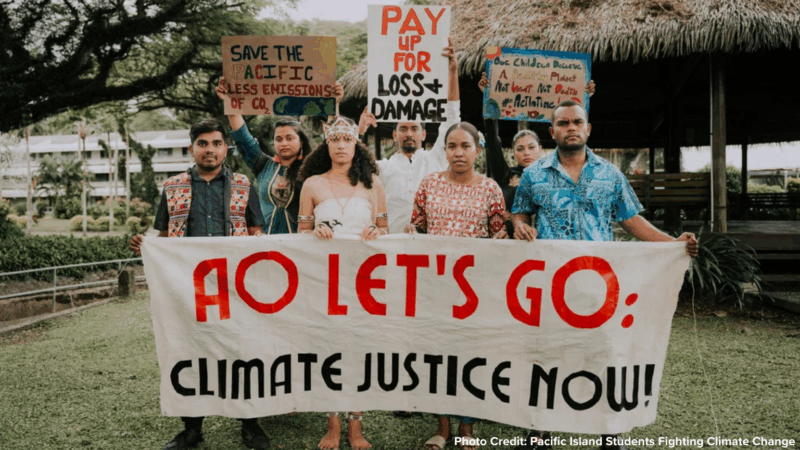
By Elsa Barron
On July 23rd, the International Court of Justice determined that states have the right to take other states to court in lawsuits over their role in the impacts of climate change. This decision is a watershed moment initiated by the Pacific Island Students Fighting Climate Change (PISFCC) and the government of Vanuatu, ushering in greater possibilities for climate accountability. High-emitting states, including the U.S., may soon have to grapple with the true impacts of their emissions on people and planet, outside of the smokescreen provided by the UN COP process.
Many Americans are familiar with the Paris Agreement of 2015, which sets a target to limit global warming to 1.5 degrees Celsius, a limit already surpassed in 2024. President Trump’s withdrawal from the Paris Agreement and recent elimination of the American workforce engaged in international climate diplomacy sent a dark signal for the future of the agreement.
Despite its importance, Paris is far from perfect. High-emitting states have embedded extensive gaps in the agreement. For example, even as the Paris agreement acknowledges that climate change causes losses and damages for impacted communities, it assures that “the Agreement does not involve or provide a basis for any liability or compensation.”
Today, there is a voluntary fund for responding to loss and damage, but without accountability, such a fund is deeply inadequate to respond to the scale of climate losses and a severe shortchange of climate justice demands. These inadequate payments for climate finance were described to me as “30 pieces of silver” by the Pacific Conference of Churches Secretary General, Rev. James Bhagwan, referencing the deepest form of betrayal: a payment for silence as the impacts of climate change intensify. Climate advocates have sought to push past this system of donor-driven hush money.
The request brought to the ICJ for an advisory opinion on the legal obligations surrounding climate change began in Vanuatu, a Pacific Island nation just over 300,000 people, where culture and governance are guided by Indigenous ni-Vanuatu tradition. The case argued before the world’s highest court last year was the combined product of decades of the country’s efforts on international climate policy coupled with flexible political leadership open to collaboration with students, civil society, and international partners alike. A record 91 written state submissions and over 100 oral statements were made to the court, which Julian Aguon, a lawyer for Blue Ocean Law working on the case, attributed to a rally for climate justice and accountability by people in the Pacific and across the world.
The new opinion provided by the world’s highest court is a turning point. Even though only an advisory opinion, this statement strongly signifies a new future for climate justice with pathways for real legal accountability beyond the limitations of the Paris Agreement. In fact, the opinion states that breaches of state obligations “may give rise to the entire panoply of legal consequences,” including obligations for cessation, reparation, and compensation.
It is not time to give up on the Paris process, which is the most comprehensive framework for global climate action. However, given that climate justice is long overdue, it is important that highly impacted states, communities, and individuals pursue all avenues for action. While the United States is not a party to the ICJ, this ruling can be used as support for other forms of legal cases against high emitters. In fact, winning a climate change case in the United States is already proven possible. Youth advocating for their right to a healthy future and environment have won recent landmark rulings in Montana and Hawai’i.
For a long time, one of the largest barriers to legal accountability for climate change was the inability to link specific disasters to individual actors. However, recent advances in attribution science suggest that it is now possible to trace specific climate-related disasters and impacts to individual states. These advances in science, growing legal precedent, and the recent ICJ advisory opinion indicate that legal accountability is on the horizon. Climate advocates can use the courts to patch up holes in the Paris Agreement and press forward. This time, the U.S. cannot opt out.
—–
Elsa Barron is a PhD Student in Peace Studies and Political Science at the University of Notre Dame and a Program Associate at the Institute for Climate and Peace.
